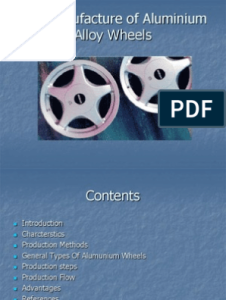How Can Alloy Wheel Manufacturers Customize Designs to Meet Specific Requirements?
In the automotive industry, alloy wheels are often used as a replacement for steel. This is because they are lighter, look good and have a lot of advantages over steel.
Alloys are also very resistant to rim rusting and they can help disperse heat in extreme driving conditions. This reduces the risk of brake failure and increases fuel efficiency.
Customization
Customization allows customers to choose products that are suited to their specific needs and preferences. This can lead to increased customer satisfaction, brand loyalty and future sales. It also can be beneficial to the company as it offers a deeper understanding of their customer base and how they use the product.
Many alloy wheels manufacturer offer a variety of designs and styles for their customers to choose from. These can be simple or complex. They can be made of different materials or have other features like a high-strength braking surface.
Some alloy wheels can be manufactured using several different techniques to ensure the best performance. These methods include casting and forging. Casting involves making a wheel from a liquid alloy that cools in a mold. As the alloy cools, there may be more porosity in the metal which can increase the likelihood of cracking under pressure. This can be avoided by sandblasting the mold before the alloy is poured into it.
Another way to enhance the tensile strength of an alloy wheel is heat treating it. This can be done during the manufacturing process or at the end of production. The process increases the tensile strength of the alloy and is often recommended by wheel manufacturers for their OEM wheel projects or contract manufacturing.
In the performance wheel market, a number of companies are working to develop lighter and more innovative wheels. Some are developing new carbon fiber composite or metal-composite hybrid wheels that can be manufactured at higher volumes with lower material costs.
However, these types of wheels are still expensive to produce and tend to be available only on high-end vehicles. Additionally, they can be difficult to pass testing requirements for temperature and strength.
If you are looking to upgrade your current vehicle with a set of customized alloy wheels, contact a wheel manufacturer today. They can help you determine the right material for your application and how to get it made at a low cost.

One of the most important aspects of the design and engineering process is selecting the correct material. There are many different materials that can be used, including steel, aluminum and magnesium alloys. Some of these materials are lighter and stronger than others, but they all have their own strengths and weaknesses.
Finishing
If you’re looking for a way to give your wheels a new look, then you may want to consider powder coating. This method is becoming increasingly popular in the automotive industry for many reasons, including its ability to produce a durable finish that looks fantastic.
The finishing process can also be a great option for those who want to get a custom color on their rims. It’s an environmentally friendly choice, as it uses fewer volatile organic compounds than other finishing processes.
Another benefit of powder coating is that it’s easier to re-spray than traditional paint. It’s also a faster process, as it only takes 20 minutes to cure. This means that it’s perfect for eager car owners and busy production staff alike.
There are a few different types of finishes for alloy wheels, including chrome, polished and PVD. These are all popular options for many drivers, and they offer unique features that can make them stand out from the crowd.
Chrome is the most popular option, and it has a wide range of colors and styles to choose from. It’s reflective, so it’s perfect for those who want to add a bit of shine and bling to their ride.
While chrome wheels tend to be more expensive than other finishes, they can be customized in a variety of ways. For example, you can customize the color to match your car’s interior.
Polished wheels are another popular option for those who want to enhance their ride with a shine that’s just as reflective as chrome, but without the additional weight or cost. This type of finish requires a special technique and isn’t as easy to customize as other wheel types, but it can create a great look for your vehicle.
A fully automated wheel painting machine, which can be used to paint both sides of a wheel from start to finish, can help eliminate inconsistencies and guesswork when it comes to painting wheels. Typically, it costs a little more than the standard wheel painting option but the results are well worth the investment.
Measurement
Measurement plays a critical role in the automotive industry. Precision-measurement sensors are used for a variety of applications, including wheel inspection, fatigue testing and hydrostatic burst test.
Alloy wheel manufacturers can customize designs to meet specific requiremen ts and ensure safety in the event of a crash. This is an essential part of automotive safety as it helps to minimize injuries in frontal collisions.
There are different types of alloy wheels and they can be made from aluminum, steel or magnesium. Alloy wheels are a great choice for most cars because they’re lightweight and can add a sporty look to a vehicle.
The main method for manufacturing a wheel is by casting or forging. This process involves molten aluminum being poured or vacuum drawn into a mold that has the shape desired. Then the aluminum is cooled down and then machined, drilled and trimmed into the final wheel.
Another common method of making a wheel is by low-pressure die-casting. This is a very cost effective method of making a wheel. However, it has some drawbacks as well. One is that it can cause porosity in the material, which is a weakness that can result in cracking.
In addition, it may be prone to warping and shrinking due to its brittleness. This is important to consider when designing alloy wheels as it can affect the structural integrity of a wheel.
For this reason, it’s best to choose a low-pressure die-casting process for aluminum wheels. This allows for better strength and durability in the wheel.
Lastly, you can also choose from a range of wheel styles and designs. This includes rims with different colors or finishes, such as black, silver, chrome or gold.
You can also get a special finish that helps to protect the surface from corrosion and dirt. This is particularly important if you’re driving in a harsh climate, where corrosion and dirt can lead to dangerous and expensive repairs.
Alloy wheels can be cast or forged, and they’re available in a wide range of sizes and styles. The most common alloy wheel size is 17 inches in diameter, though you can see larger wheels on SUVs and trucks.
Design
Alloy wheels are made from a mix of different alloys that are usually lighter than steel, thereby increasing performance and reliability. Aluminum and magnesium are two common alloys used in automotive wheels.
In addition to being light, alloy wheels can be manufactured in a wide range of shapes and sizes. This allows them to be designed to match many vehicle types and styles. Alloy wheels are also available in a variety of finishes and colors, so they can be customized to match a specific car model or style.
Most people purchase alloy wheels for a variety of reasons. They can make a vehicle look more sporty and attractive, they are often cheaper than a new set of steel wheels, and they are less likely to rust.
They can also improve a vehicle’s fuel efficiency and handling. Compared to steel wheels, they are lighter and allow the vehicle’s suspension to follow the terrain better, which can improve grip. In extreme driving conditions, alloy wheels can also dissipate heat away from the brakes, reducing the risk of brake fade.
Alloy wheels are also more stylish than their steel counterparts and can be made to match a vehicle’s exterior color. If you are planning on purchasing a set of alloy wheels for your vehicle, it is important to know the exact specifications for each wheel size and brand to ensure they are the right fit.
Flow formed wheels are a step up in load bearing capacity (and strength) from cast wheels and can be manufactured with an intricate design for added performance. Flow forming is a sophisticated process that uses pressure to cause the wheel rim to flow in a specified direction, strengthening it while reducing weight.
Forging is another manufacturing process that can be used to create a high-performance wheel. This method essentially machines the wheel from an alloy billet, resulting in a strong, lightweight and durable finish.
Most major automobile manufacturers produce their own alloy wheels for use on their vehicles. They are typically made from a mixture of aluminum and magnesium, but can be made from other alloys as well. Alloy wheels are a popular choice for cars and trucks because they are lighter, more stylish and reliable in heat dissipation. They are also more affordable than steel wheels, and can be refinished over time to protect them from corrosion.



